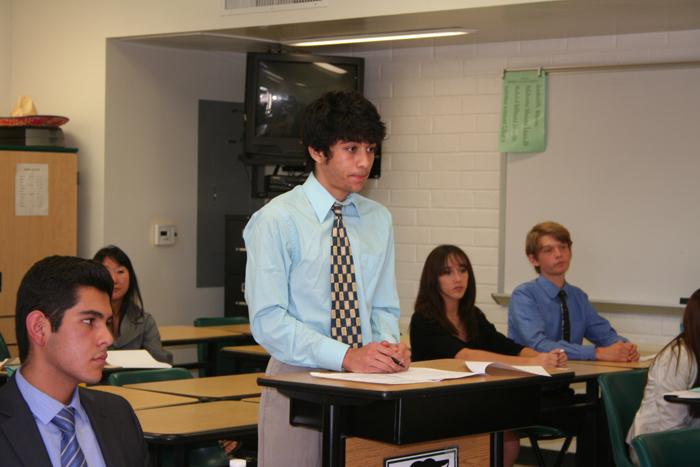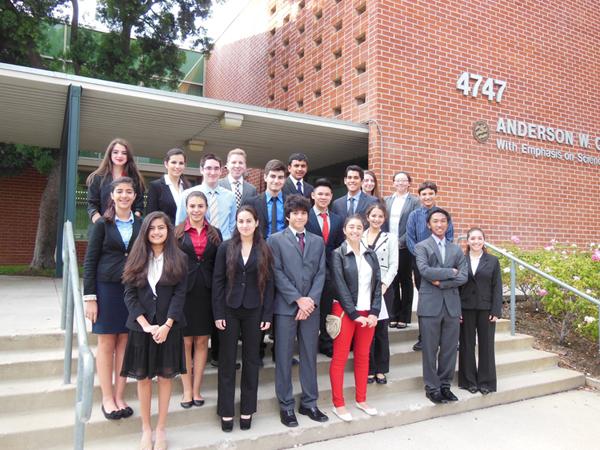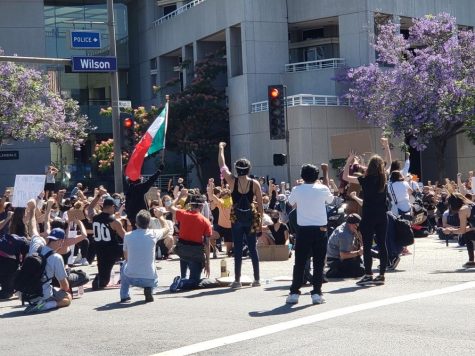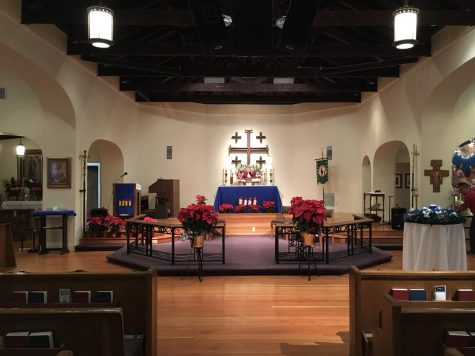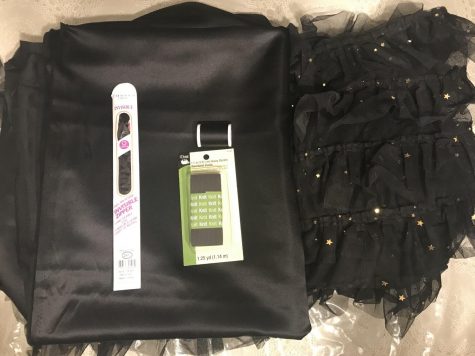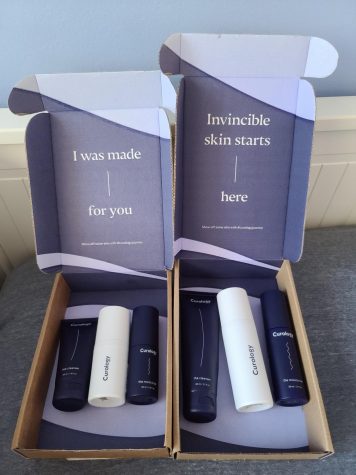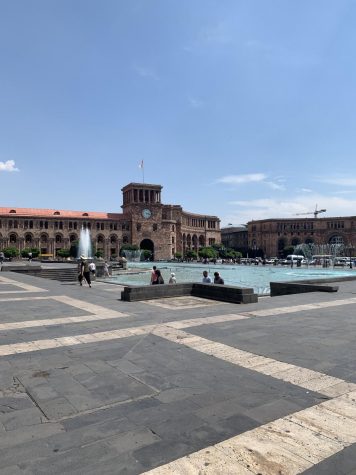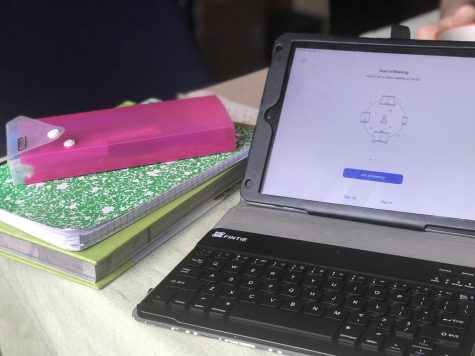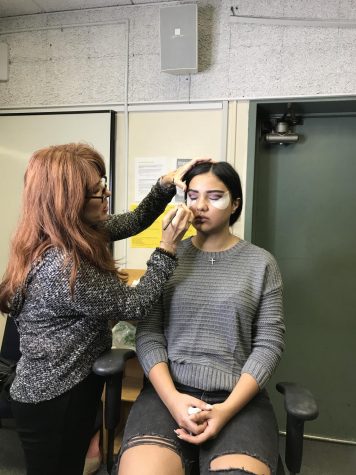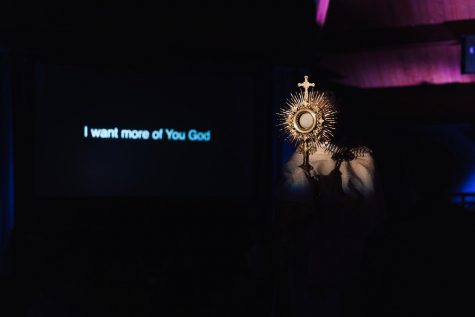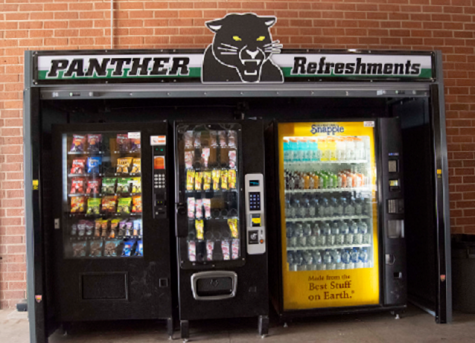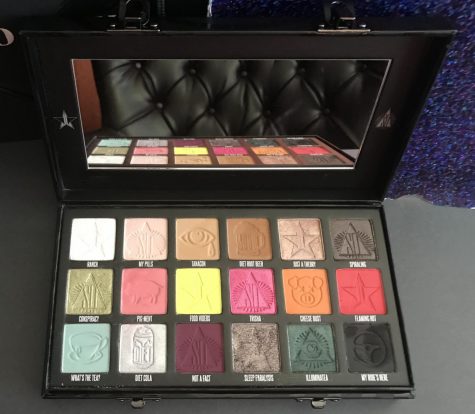The makings of Mock Trial
Senior Issa Al-Hadeed practices his part during a scrimmage with CV on Oct. 20.
“All rise. Department 47 of the Superior Court of Los Angeles County is now in session. Judge Silverman presiding. Please be seated,” said a tall teen from Team 318, our rival that night of our first competition in the national mock trial competition. (School names aren’t used to preserve fairness).
As I sat down in my chair at the prosecution table, I fidgeted with many assorted papers I had laid out for whatever Fate had in store for me. As my time to deliver my opening statement edged nearer, I felt my sweaty grasp on my flashcards tighten. Despite my hours of preparation and living room rehearsals, I couldn’t help but worry, “What if I mess up?”
Although I was anxious about my performance, I could feel my adrenaline pumping. I was ready to compete, and most of all I wanted to give it my best shot. The night was Nov. 12, 2013, my last time I would participate in the high school Mock Trial program.
When some people hear “Mock Trial,” the first things that pop into their heads are being bombarded with intimidating legal jargon and being subjected to an insurmountable amount of work. These popular myths seemed to disillusion themselves as I went through my four years participating in Clark’s Mock Trial Team.
The Mock Trial program was established by the Constitutional Rights Foundation (CRF) in 1980, when CRF decided to create a state competition based on California counties. According to its official website, CRF created this program to give students the opportunity to “further an understanding of both the content and processes of our legal system, increase basic skills, analytical ability, and self-confidence; and promote cooperation among students of various cultures and interests.”
Mock Trial consists of a different fictional case each year, with high school-related characters and situations (ie drug dealing, cyberbullying, assault, and even murder). Each case is released in mid-September to all California teams, and then the county competitions begin at different times, with Los Angeles being the first in early November. Each team’s roles are eight lawyers and eight witnesses (four defense and four prosecution each), a bailiff, a courtroom artist, a courtroom journalist, and alternates to fill in for other team members who cannot compete.
Phases of the CRF High School Mock Trial are timed and include a pre-trial motion, opening statements, direct and cross examinations of both sides’ witnesses, and closing statements. On competition dates, each side (either prosecution or defense) competes against another team (either defense or prosecution) in presenting their case, all the while taking place in an actual courtroom with a judge and being scored by volunteer attorneys.
Whichever team has won both rounds moves on to the following rounds until one representative high school of the county is left standing. Currently, 36 California counties compete in the state Mock Trial. This year, Clark was one of the 80 high schools competing within Los Angeles County, the state’s largest competing county.
Clark’s Mock Trial Team began in the 1999 school year when World History teacher Chris Davis introduced the program to Clark students. However, the program then changed faculty advisors the following year to former English teacher Melanie Martin, and eventually moved to Spanish teacher Melissa O’Gara as well as English teachers Diana McGrath and Stephanie Sajjadieh.
Clark’s attorney coach, Los Angeles Superior Court Judge Michael O’Gara, has been with the team since it started in 1999. “[CRF Mock Trial] is a fantastic program that turns high school students into trial attorneys within two months,” said Judge O’Gara. As a former trial attorney and current judge, O’Gara said that this experience is very applicable to what a trial attorney would encounter every day, and allows students to “learn to think like an attorney and present the appropriate facts and evidence in a real courtroom.”
This year’s case was People v. Concha, a case where the defendant Rae Concha of Rosewood High School was charged with possession with intent to sell of a controlled substance and second-degree murder. After receiving access to the official case packet, which contained all the fact situations, witness statements, and exhibits, I met with this year’s advisors, Mrs. O’Gara and Ms. Sajjadieh, to discuss who would fit best in each role.
From there, Clark’s Mock Trial team met every Wednesday at enrichment as well as on Sundays in the O’Gara’s home, whose living room was set up as a mock courtroom. These weekend meetings proved to be instrumental in our progression as we were able to get valuable feedback from our attorney coach on how to word our arguments or questions for direct or cross examination.
Additionally, our witnesses, which entail officers, medical experts, teachers, and high school students, also were able to practice their portrayal which is also an important part of our team’s success.
One witness, freshman Anna Parsamyan, said that although she had an interest in law, she was drawn to the witness role because she liked the idea of “becoming a character.” Parsamyan played defense witness Avery Perkins, the defendant’s band coach who vouched for the defendant’s upstanding moral character and cast blame onto another witness as the possible drug dealer. “Going over my notes helped me a lot, and so did being questioned in front of everyone during our weekend practices,” Parsamyan said.
Within recent years, Clark has also been able to have a scrimmage with the Crescenta Valley High School’s team a few weeks prior to the actual competition dates. This year’s scrimmage took place on Oct. 20 at Clark (a first for Clark’s team) in the 5300s wing with one room conducting the case with CV defense v. Clark prosecution and vice versa in the other.
Junior Alen Shirvanyan, a second-year prosecution lawyer, felt that these scrimmages with the CV team gave us a leg up on our actual competition dates. “CV’s team did extremely well last year,” said Shirvanyan, “and it was a great experience to practice with another team’s argument and objections that were different from our own.”
After all of our weekend practices and enrichment cramming sessions, the date arrived for Clark’s prosecution team to compete on November 12, the day where I was going to compete (our defense team had previously competed on Nov. 4 and received a score of 147 out of 190, a new record). As the acting Mock Trial president, I really wanted to make sure that our performance went just as well as the defense’s, in hopes of making Clark History and advancing past the second round.
Other pressures that our prosecution team faced included time management (as we are only allotted 14 minutes to question four witnesses, each with plenty to say), memorizing our speeches (for those giving opening and closing statements), and of course mastering how to argue and defend an objection. Although the nerves were and many of us were glued to our flash cards, once we entered room 319 (our randomly assigned courtroom), we felt the nerves begin to unwind as the spirit of competition began to set in.
“Right before you go to speak in front of the judge or question your witness, you’re nervous,” said my fellow prosecutor teammate Shirvanyan, “but as soon as you’re up on that podium nothing can stop you.” We had been well-trained and felt confident that nothing the other side could throw at us would deter us from winning.
After much anticipation, the next day we received our score — 153 out of 190! We had set the highest score of a mock trial team in Clark history! For the first time since I’ve been apart of Mock Trial since freshman year, I felt that we truly had a chance of advancing to the third round, which means being among the top 16 schools with the highest scores.
However, with a heavy heart our advisor Mrs. O’Gara posted on our Facebook group page that we did not make it to the next round. I was initially devastated, and felt like I had blown my one last chance to make history and that I had let my team down. However, I realized that I had spent four years being a part of a program that I love, and have grown so much because of it — in both knowledge of legal proceedings and in self-confidence.
“I was very impressed with this year’s team; this was the best team Clark has had in all my years of helping with mock trial,” Judge O’Gara said of this year’s team’s overall performance. “We missed going on to the next round by a few points, but I already know that we will do a fantastic job next year to show that we are a team to contend with.”
Despite the amount of prep work and commitment this program does entail, it hardly seems like much once you become enraveled in the story and your side’s argument. The passion soon does take over once you’re in the lawyer’s seat or on the witness stand. If you think about it, Mock Trial gives you and your high school friends the chance to try a realistic criminal court case in an actual courtroom. When else do you have an opportunity like that?



